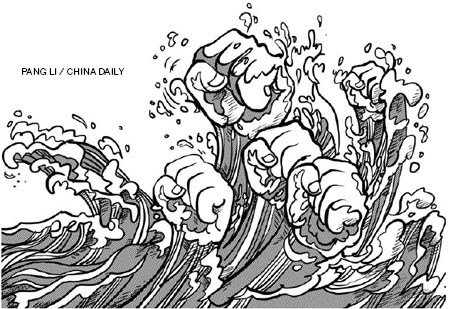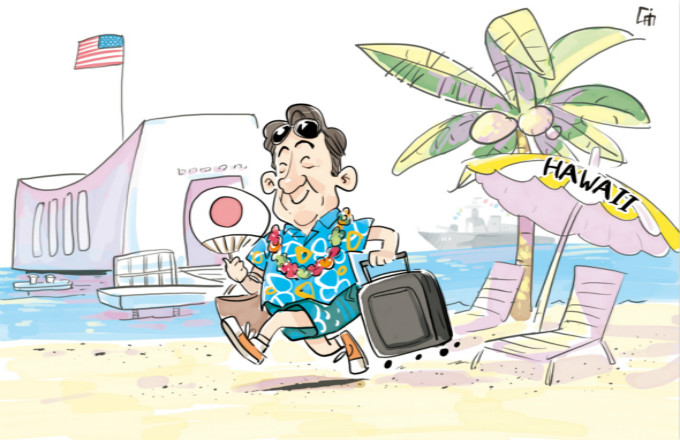High time for sea change

As part of the government restructuring plan released on Sunday, China will bring its maritime law enforcement forces under the unified management of one single administration, which will retain the name the State Oceanic Administration. This is an important step for China to better safeguard its maritime interests and achieve the goal of becoming a maritime power.
At present, China has five maritime law enforcement agencies: the Marine Surveillance of the State Oceanic Administration, the Coast Guard of the Public Security Ministry, the Maritime Safety Administration of the Transport Ministry, the Fisheries Law Enforcement Command of the Agriculture Ministry, and General Administration of Customs. They are often referred to as the "Five Dragons".
Though the Five Dragons have been playing an important role in safeguarding China's maritime rights, it is becoming increasingly difficult for them to handle unexpected crises and their functions have been hampered because they have no unified management. Upgrading the State Oceanic Administration will enable it to do the overall planning for national oceanic affairs and improve the nation's administration of its maritime territory.
The new Oceanic Administration will have under its control China Marine Surveillance, the coast guard forces of the Public Security Ministry, the fisheries law enforcement command of the Agriculture Ministry, and the maritime anti-smuggling police of the General Administration of Customs.
The reshuffle is a necessary beginning, but China needs to make more efforts to become a maritime power.
China's economy has grown by leaps and bounds in the past three decades but it has also become highly dependent on exports. Now that China has basically completed its plan for the land, it should focus on the seas to ensure continuous economic growth. This is especially important because, despite its huge coastline, China is not a big maritime power.
At the 18th National Congress of the Communist Party of China, the country's leaders announced that the nation would accelerate the development of its ocean resources, resolutely safeguard its maritime rights and interests, and develop into a big maritime power.
A big maritime power is one that develops the seas and its resources to benefit the country and safeguard its maritime territories and rights. A big maritime power is also one that develops its marine resources and maritime economy, protects its marine ecology and boosts its coastal defenses.
By becoming a significant maritime power, China can improve the development pattern of its marine resources - making it more reasonable and orderly - coordinate the distribution of land and sea resources and make its economy sustainable. Becoming a big maritime power will help China develop innovative marine technology by promoting deeper research into significant marine issues and it will help China protect its marine ecology and biodiversity. On the military front, it will help China strengthen its maritime forces and coastal security, and help it protect its overseas interests.
To become a big maritime power, China should expedite the development of its marine economy by focusing on its sea resources and promoting innovative marine technology.
Some foreign politicians claim that China wants to become a big maritime power to seek hegemony, which is absolutely unfounded. They are not ready to accept that the rapid rise of China has had a great impact on the global landscape and instead they are determined to contain China.
Many established maritime powers are not comfortable with the idea of China also becoming a maritime power. China's focus on its land territory in the past prompted some countries to occupy some of its islands, and now that it has turned its attention to the seas to safeguard its maritime territories, some countries have become uncomfortable.
Only people who are unaware of Chinese history and culture misread China's quest to develop into a big maritime power as an attempt to seek hegemony. China seeks harmonious development of the seas, and it has repeatedly emphasized the need for peaceful development of the seas. But although China is committed to being a peaceful maritime power it must resolutely safeguard its maritime interests. Therefore, it is time the Chinese government adopted a strategy to deal with some countries' attempts to prevent it becoming a maritime power.
First, China should set up a national maritime think tank to strengthen its ocean strategy and boost its maritime research and development programs. For example, it should use the basis of the China-ASEAN free trade zone to establish an economic circle around the South China Sea to avoid escalation of disputes, deepen mutual trust and launch development projects for the welfare of people in the region.
Second, it should increase its academic interaction and communications with countries with which it has disputes to resolve them peacefully. It should also launch a campaign to let other countries know the real reasons why it's strengthening its maritime forces in order to stop them viewing it with anxiety and suspicion.
Third, keeping an eye on the maritime disputes, China should develop its oil and gas sector before expanding its fishery and tourism activities, adhering all the time to peaceful development and harmonious co-existence.
The author is a professor at the School of Politics and Public Administration, Guangdong Ocean University.
(China Daily 03/11/2013 page10)

























